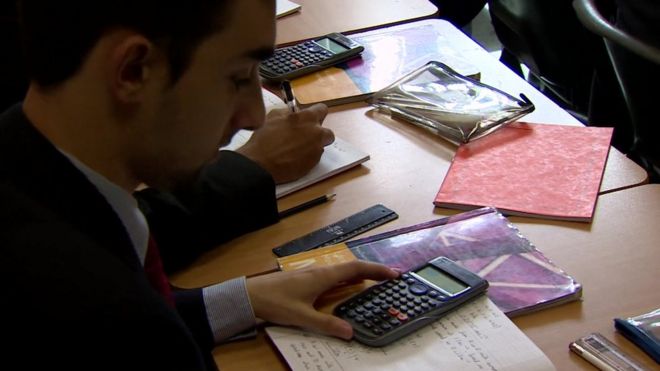
Grammar schools could be dumbed down by expanding them in areas where parents want them, analysis of plans to increase selection in England suggests.
An Education Policy Institute study says as grammars expand, they will take more lower ability pupils – diluting their high achieving potential.
It also argues the negative impact on nearby schools is greater because more lower ability pupils are left behind.
The Department for Education said they want the plan to help local schools.
The government said the report focused on the binary system of the past but thiswas not what its plans intended to recreate.
The EPI report models what would happen to grammar schools by expanding them in the way the government is considering.
It talks about a grammar school bonus for those pupils studying in them, describing it as an extra 2.4 grades at GCSE across eight subjects for all pupils in the current stock of grammars.
For the small minority of the poorest pupils in grammars – those on free school meals – it works out as 3.9 grades, which is half a grade per subject compared with pupils at other types of schools.
Tipping point
Research author and associate director at EPI, Jo Hutchinson, said the decline in the benefits of grammar school education would be seen most in areas with more selection.
These are the areas where parents tend to want more grammars, according to polling cited by the study.
Ms Hutchinson acknowledged that high achieving schools would be dumbed down.
She said: “When we add more grammar school places to an area, these schools will have to fill their places with children who are further down the ability scale.
“They will pick the next most able children and the raw potential of these pupils will be lower.
“In the areas where there are more places, the benefits are going to be more diluted for those children in the grammar schools, as they become more like mixed ability schools.”
She believes that those not in grammar schools will also suffer because “the bunch of children who are left behind are a bunch of lower attaining children”.
She said this situation would be exacerbated further by requiring grammar schools to take a quota of poorer children, as has been suggested by Prime Minister Theresa May as a way of boosting social mobility.
‘Weak argument’
“In a quota system – whether it’s free school meals or parents on lower income – they are going to be a group that is lower attaining on average.”
This would dilute the high achieving nature of the schools faster, she said.
The report identifies a “tipping point” at which the positive effects of attending a grammar school start to reduce and the negative effects of not attending one increase.
This was when 70% of the top quarter of high achieving pupils at the end of primary school acquired a grammar school place.
Overall, the report debunks government claims that expanding grammar schools will boost social mobility.
Superficially, it says, grammar schools appear to do well in closing the attainment gaps between poor children and others studying in them
But when researchers took into account the high achieving nature of the very small minority of disadvantaged pupils who reach grammar schools, most of this difference disappeared.
‘Lower incomes’
The study said if more grammar school places were created in areas where parents wanted them, this would lead to a net loss of 7,000 GCSE grades for the poorest pupils in areas where selective schools are concentrated.
It also found that proposals to increase the number of grammar school places in England were unlikely to improve attainment overall.
The Department for Education is understood to be researching the impact of more grammar school places, as well as running a consultation on the plans announced earlier this month.
It said: “Our new approach would ensure any new selective schools prioritise the admission of pupils from lower income households or support other local pupils in non-selective schools to help raise standards.
“We are clear that relaxing restrictions on selective education can and should be to the betterment, not at the expense, of other local schools.”
Malcolm Trobe, acting head of the Association of School and College Leaders, said: “It clearly shows that creating more selective schools will not raise overall educational standards in England and is likely to widen the attainment gap between rich and poor children.
“The government must now listen to the evidence and abandon its misguided policy.”
[Source:- BBC]







